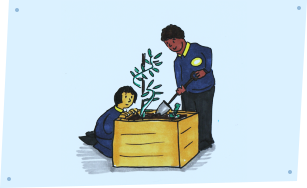P.E
Intent
We recognise that physical education is paramount when it comes to creating learners who have a life-long passion for physical activity and sport. Active children are healthier both physically and mentally. We believe that nurturing healthy children is best achieved by creating a curriculum that is intrinsically motivating; focuses on small-sided games; promotes decision-making and tactics; and is imbedded within a context of low-stakes competition. Furthermore, we believe that a PE curriculum should be holistic: creating leaners who are willing and able to use their head (thinking skills), their body (physical skills) and their heart (social skills). Beyond merely a subject, we believe that participation in sporting activity is a key element of developing a school in which pupils are proud of the community in which they belong. This is why we promote competition and encourage as many children as possible to represent the school in a range of sports.
Through our Physical Education curriculum we intend to:
- Teach children who are willing and able to be strong leaders, to co-operate and to work as a team.
- Teach children to have strong thinking skills through opportunities for decision making, problem solving and the development of tactics.
- Provide opportunities for the mastery of physical skills by delivering a spiral curriculum that revisits and embeds key concepts.
- Develop opportunities for competition, both informally and formally.
- Teach children to have the necessary vocabulary to understand and discuss physical activity.
- Provide opportunities for being physical active outside of lesson time.
- Utilise the strategies of Teaching Games for Understanding (TGfU).
- Support all children to make good progress through interventions, scaffolds and competition.
Implementation
The key knowledge and skills of each topic are mapped across each year group. This ensures that children develop their knowledge of games, dance, gymnastics, athletics, outdoor and adventurous activity progressively. The skills in these areas are also therefore developed systematically, with the programme of study for each year group building on previous learning and preparing for subsequent years. We follow a spiral curriculum where key concepts are revisited across year groups.
Within every lesson, children play small-sided games. This ensures children receive as much opportunity as possible to master physical skills. Sessions avoid children queuing unnecessarily. Children are given regular opportunities to test their skills in accurate, game-like situations and competitions. As well as that, competition is arranged against other schools to allow children to represent their school and compete at a high level. As well as focusing on physical skills, lessons incorporate thinking skills and social skills.
To deliver our Physical Education curriculum we will:
- Teach children for two one hour lessons per week: one outdoor lesson with the class teacher (invasion games, athletics, striking and fielding, net games and outdoor adventurous activity) and one indoor lesson (dance and gymnastics) with a specialist sports coach.
- Teach games which are designed to focus on a particular skill.
- Provide opportunities for co-operation and decision making.
- Organise small-sided games with one vs one or small-team activities.
- Teach social skills explicitly with a focus on good sporting behaviour and co-operation.
- Explicitly teach, revise and use key vocabulary in every lesson.
- Give children the opportunity to work with many different partners across all topics.
- Ensure that children evaluate their own learning and that of their peers.
- Provide opportunities to nurture leadership qualities with children given the chance to lead warm-ups, coach their peers, run games and to officiate.
- Ensure our lessons are differentiated using the STEP principle so that all children can make progress.
- Provide gross-motor skills intervention weekly for those who need support.
- Organise regular competitions against other schools as a members of the Barnet Partnership for School Sports in football (mixed and girls), tag rugby, athletics, sports hall athletics, gymnastics, netball, boccia and basketball.
- Provide weekly after school clubs in football, gymnastics, dance and netball.
- Facilitate for specialist sports coaches to lead lunchtime activities every day for all classes.
Impact
As a result of our PE curriculum, our children are physically active and competent, are able to apply a range of social skills and are problem-solvers.
The impact of our Physical Education curriculum is measured by:
- Children who are willing and able to be physically active and seek opportunities to be so beyond lessons.
- Children who have the competence, confidence and commitment to be physically active into secondary school and into adulthood.
- Children who can demonstrate good social skills in lessons and transfer these to other areas of their daily lives.
- Children who can discuss sport and physical activity using the appropriate vocabulary.
- Children who are competent at a range of physical skills that gives them the confidence to take part in physical activity.
- Children who are willing and able to problem solve, think tactically and apply skills to a range of different games.
- A range of children representing the school in a plethora of sporting competitions.
- Most children making good progress through PE skills and units.
- Children displaying leadership skills learnt from PE in other areas of the curriculum.
- Receiving the gold award in the School Games Mark for our commitment to school competition.
Assessment
Assessment for learning is key when it comes to students making progress in lessons. Teachers and learning support assistants adapt activities to help suit the needs of individuals by utilising STEP (altering the space, task, equipment or people) in order to scaffold/stretch learning. Self and peer assessment are embedded - children are given opportunities to share their successes and those of their peers. Small game/competition scenarios at the end of units allow teachers to summatively assess progress.
Click here to see how our Sport's Funding is spent.

